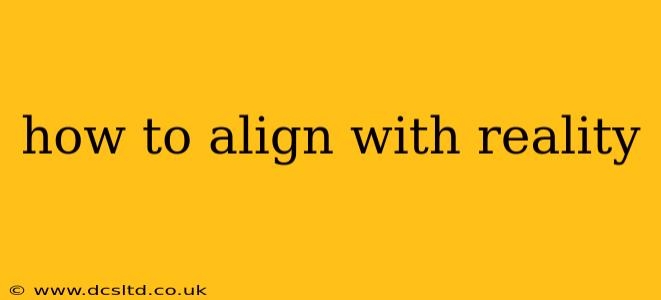Living in alignment with reality can feel elusive, especially in a world saturated with social media filters and unrealistic expectations. But aligning with reality isn't about surrendering to negativity; it's about developing a clear-eyed understanding of your circumstances and cultivating a life grounded in truth and authenticity. This allows for more effective action and genuine happiness. This guide offers practical steps to help you achieve this vital alignment.
What Does it Mean to Align with Reality?
Aligning with reality means accepting the present moment as it is, without judgment or resistance. It involves acknowledging both the positive and negative aspects of your life, your strengths and weaknesses, and your opportunities and challenges. It's about recognizing your own biases and limitations while striving for objective self-awareness. This isn't about passive resignation; rather, it's about gaining a realistic understanding of your current situation to empower effective action.
How to Cultivate Reality Alignment: A Step-by-Step Approach
Here's a practical framework to help you better align with reality:
1. Identify Your Distortions: Where is your perception off?
We all have cognitive biases that distort our perception of reality. Are you prone to catastrophizing (assuming the worst)? Do you engage in all-or-nothing thinking? Do you minimize your successes while magnifying your failures? Identifying these biases is the crucial first step. Journaling can be incredibly helpful in uncovering these patterns. Ask yourself:
- What assumptions am I making? Are these assumptions based on facts or feelings?
- Am I filtering information to support my preferred narrative? Are there other perspectives I'm ignoring?
- Am I focusing on the negative while ignoring the positive aspects of my life?
2. Practice Mindfulness and Present Moment Awareness
Mindfulness helps you become more acutely aware of your thoughts, feelings, and sensations without judgment. Regular mindfulness practice, such as meditation or deep breathing exercises, can help you stay grounded in the present moment, reducing the tendency to dwell on the past or worry about the future. By focusing on the here and now, you can more readily assess your current reality without the fog of emotional distortion.
3. Challenge Your Negative Thoughts and Beliefs
Negative self-talk and limiting beliefs can significantly distort your perception of reality. When you catch yourself thinking negatively, challenge the validity of these thoughts. Ask yourself:
- Is this thought based on evidence?
- What would I tell a friend who was thinking this way?
- What's a more balanced and realistic way to view this situation?
4. Set Realistic Goals and Expectations
Setting unrealistic goals can lead to disappointment and frustration, pulling you further from alignment with reality. Break down large goals into smaller, more manageable steps. Celebrate your progress along the way, acknowledging your achievements rather than focusing solely on what remains to be done.
5. Seek Feedback and Perspective from Trusted Sources
Sometimes, it's hard to see our own blind spots. Seeking feedback from trusted friends, family members, or a therapist can provide valuable outside perspectives. They can help you identify areas where your perception may be skewed and offer alternative viewpoints.
6. Embrace Imperfection and Accept Failure as a Learning Opportunity
Life is full of imperfections and setbacks. Accepting this reality is crucial for aligning yourself with it. Instead of viewing failures as personal shortcomings, view them as opportunities for learning and growth. Embrace the process, focus on continuous improvement, and learn from your mistakes.
7. Prioritize Self-Care
Self-care isn't selfish; it's essential for maintaining mental and emotional well-being, both of which are vital for accurately assessing and navigating reality. This includes adequate sleep, healthy eating, regular exercise, and engaging in activities you enjoy.
By consistently applying these strategies, you can cultivate a stronger sense of alignment with reality, leading to increased self-awareness, greater emotional stability, and a more fulfilling life. Remember that this is a journey, not a destination, and progress will take time and consistent effort.
